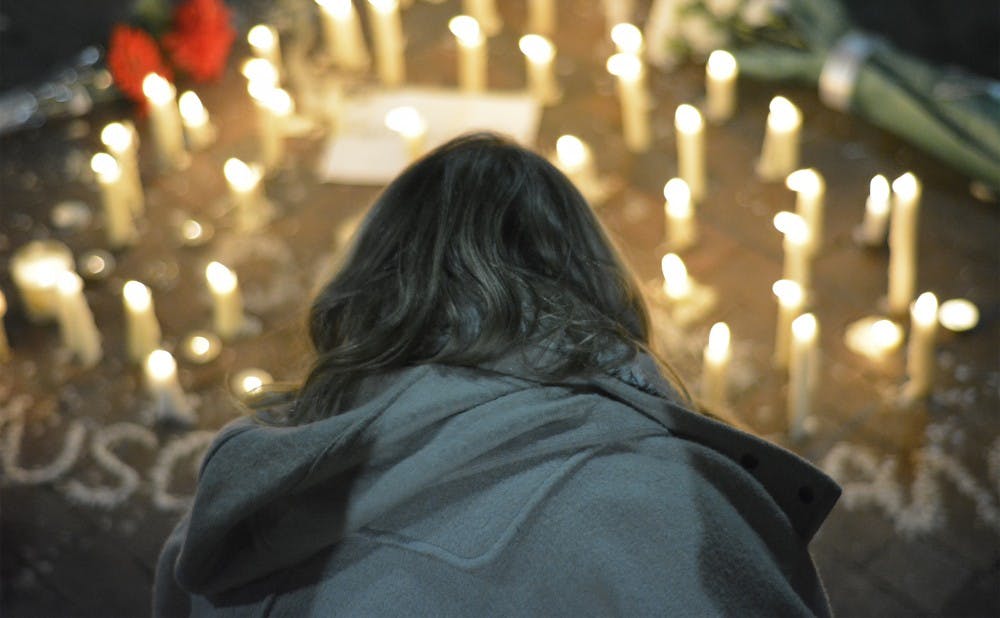The murders of three Muslim students in Chapel Hill, NC earlier this month has brought national attention once again to how hate crimes are prosecuted in America.
Although Craig Hicks, the perpetrator, was indicted on three counts of first-degree murder by a grand jury Feb. 16, neither State nor Federal prosecutors have indicated plans to charge him with a hate crime. Public discourse over the deaths of Deah Shaddy Barakat, Yusor Mohammad Abu-Salha and Razan Mohammad Abu-Salha, however, has focused heavily on whether religious hatred played a role. The case has raised important questions about the role and purpose of hate crime prosecutions as well as the evidentiary standard needed to bring hate crime charges in the first place.
According to Darrell Miller, professor of law at Duke Law School, North Carolina has an ethnic intimidation law that prosecutors could pursue against Hicks.
“The law says that if a person, because of race, color, religion, nationality or country of origin, assaults another person or damages or defaces the property of another person, or threatens to do any such act, they shall be guilty of a class 1 misdemeanor,” Miller said.
It is still unclear whether or not an ethnic intimidation charge would serve any practical purpose. Colon Willoughby, former Wake County district attorney and current partner at McGuireWoods LLP, added that Hicks could be punished severely sans ethnic intimidation charges.
“The question that I think prosecutors will look at is whether seeking a charge of ethnic intimidation will in practical terms change the equation of what happens in the case,” Willoughby said. “If you’re prosecuting and you convict someone for three counts of first-degree murder, there are only two sentences, death or life imprisonment without parole.”
Willoughby also added that tacking on an ethnic intimidation charge might actually do a disservice to the prosecution.
“You’re looking at a charge that would require the state to prove the motive of a crime beyond a reasonable doubt,” Willoughby said, “when in order to prove first-degree murder you would only have to prove malice and pre-meditation. To require you to prove additional motivation beyond that is a distraction and something I don’t think prosecutors ordinarily want to bind themselves to.”
The Federal Bureau of Investigation is conducting a parallel investigation into the case, and it is possible for the federal government to bring hate crime charges in addition to actions North Carolina takes.
Chris Brook, legal director of the North Carolina American Civil Liberties Union, added that similar concerns over the practicality of hate crime prosecutions can be raised at the federal level.
“If you have a situation where somebody is sentenced to life imprisonment without parole or death, obviously an additional ten years of prison is from a practical standpoint not going to have any sentencing outcome,” Brook said. “It’s only going to matter if the sentence was less than one of those two.”
Kavi Chamis Simmons, former federal prosecutor and current professor of law at Wake Forest Law School, added that it would be unlikely for the federal government to bring hate crime charges if Hicks were to be already convicted of first-degree murder.
“What you often see is that the federal government acts as a back-stop,” Simmons said. “Criminal justice issues are typically local in nature, so you’re not going to have the federal government intervening unless they think that there was an extreme or manifest lack of justice. Where you got a conviction for a crime as serious as murder, this is not likely to happen.”
Brook, however, added that prosecutors must consider other benefits than sentence enhancements when deciding if to press hate crime charges.
“I think that these prosecutions can serve a symbolic purpose as well,” Brook said. “We’re dealing with a broader societal sense of Islamophobia and a number of activities throughout the country where Muslims have been intimidated or harmed due to their religious beliefs, and I think there is great importance in standing up for what our Constitution has always stood up for in the rights of minorities.”
Before either state or federal prosecutors can grapple with those issues, they first have to determine whether Hicks’ behavior meets the standards of what constitutes a hate crime, and that question has not yet been settled.
Brook also added that first amendment concerns would make it difficult for the prosecution to argue that Hicks meets these standards.
Miller added that Hicks’ Facebook posts, in which he, as an atheist, seemingly criticizes all religions and not Islam in particular, might make it harder to prove hate crime was committed in this case.
“If his motivation was against just religion in general, I think it makes it harder to show this was really a motivating factor with regards to these specific individuals,” Miller said. “I’m not sure a disfavoring of all religions is enough to show an animus against one person’s specific religion.”
Simmons added that, ultimately, it is premature to assume that this crime was a hate crime or that a hate crime prosecution will be brought by either North Carolina or the federal government.
“I understand that members of the Muslim community may be viewing this as a hate crime,” he said. “I’ve heard about the manner in which these victims were killed, shot in the back of the head execution-style, and that perhaps the victims themselves felt targeted due to their religion, and that’s why I think it {the possibility of a hate crime} should be investigated. We just have to wait and see what the fruits of that investigation are to figure out what happened.”
Get The Chronicle straight to your inbox
Signup for our weekly newsletter. Cancel at any time.

